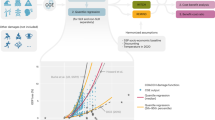Abstract
In this paper, we present a new specification of warming cost and incorporate it into an integrated assessment model of global climate change. In the new specification, warming cost is represented as the product of possible large warming related welfare losses which occur with small probabilities that depend on the amount of temperature rise. This is in contrast to the conventional representation of warming cost as a deterministic function of temperature rise. To avoid ‘curse of dimensionality’ problems, we assume that losses affect the utility of consumption without directly affecting consumption itself, and that the probability of losses occurring is independent of the number of losses that may have previously occurred. The results we obtain using this new approach depend importantly on the specification of the loss probability function. Nevertheless, our results are qualitatively similar to previous results obtained using a deterministic specification of warming cost, in which cost is a cubic function of temperature rise.
Similar content being viewed by others
References
Chao, Hung-Po: 1995, ‘Managing the Risk of Global Climate Catastrophe: An Uncertainty Analysis’,Risk Analys., (forthcoming).
Cline, W. R.: 1992,The Economics of Global Warming, Institute for International Economics, Washington D.C.
Dowlatabadi, H.et al.: 1994, ‘An Overview of the Integrated Climate Assessment Model, version 2: ICAM-2’, paper presented at the Western Economic Association Conference, Vancouver, B.C. June 29.
Maier-Reimer, E. and Hasselmann, K.: 1987, ‘Transport and Storage of CO2 in the Ocean - An Inorganic Ocean-Circulation Carbon Cycle Model’,Clim. Dynamics 2, 63–90.
Manne, A. S. and Richels, R. G.: 1994, ‘The Costs of Stabilizing Global CO2 Emissions: A Probabilistic Analysis Based on Expert Judgements’,Energy J. 15(1, 31–56.
Nordhaus, W. D.: 1990, ‘Contribution of Different Greenhouse Gases to Global Warming: A New Technique for Measuring Impact’, February 11.
Nordhaus, W. D.: 1994a, ‘Expert Opinion on Climatic Change’,Amer. Sci., January-February, 45-51.
Nordhaus, W. D.: 1994b,Managing the Global Commons: The Economics of Climate Change, MIT Press, Cambridge MA.
Peck, S. C. and Teisberg, T. J.: 1992, ‘CETA: A Model for Carbon Emissions Trajectory Assessment’,Energy J. 13(1, 55–77.
Peck, S. C. and Teisberg, T. J.: 1994, ‘Optimal Carbon Emissions Trajectories when Damages Depend on the Rate or Level of Global Warming’,Clim. Change, November, 289-314.
Peck, S. C. and Teisberg, T. J.: 1995, ‘International CO2 Emissions Control: An Analysis Using CETA’,Energy Policy 23(4), (forthcoming).
Schlesinger, M. E. and Xingjian, Jiang: 1990, ‘Simple Model Representation of Atmosphere-Ocean GCMs and Estimation of the Time Scale of CO2-Induced Climate Change’,J. Clim., December, 1297-1315.
Author information
Authors and Affiliations
Rights and permissions
About this article
Cite this article
Peck, S.C., Teisberg, T.J. Optimal CO2 control policy with stochastic losses from temperature rise. Climatic Change 31, 19–34 (1995). https://doi.org/10.1007/BF01092979
Received:
Revised:
Issue Date:
DOI: https://doi.org/10.1007/BF01092979




